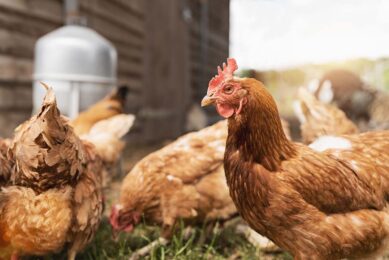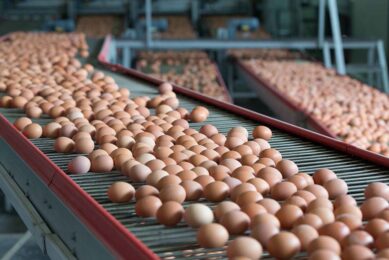Egg producers enjoy higher prices and up production

Rising egg prices have led to a growing number of producers looking to expand following a rise in prices over the past few months. UK producers aim for long-term relationships with retail to break the boom or bust the egg production cycle.
After a chaotic past 12 months, which saw a significant shortage in supply with producers pulling out of production due to prices slumping at low as 101.1 pence per dozen in September, prices have risen. In March 2023, the British Free Range Producers Association (BFREPA) price increased to 132.82p per dozen – a rise of nearly 11p on the month.
Commercial poultry housing company, Powell and Co., said it had seen a rise in the number of producer enquiries. Sales director, Adam Langley, speaking of February/March, said: “We have seen more activity, particularly within the free-range sector. A number of producers who had plans for expansion when the egg market began struggling put their jobs on hold. Those producers are now coming back to use and looking to put units in.
“Produces are starting to realise that raw material prices are not going to drop back to the levels they were in 2019, and are thinking of the long-term future of their businesses. Planning permission that may have been granted needs to be acted upon before it runs out, while producers want to invest for their future.”
Langley added that the majority of people making enquiries already had units in place and were looking to expand, with questions around 16,000, 32,000 and 64,000 capacity buildings.
Pressure
Adam Dye from equipment supplier Newquip, said inquiries had risen but were currently of a tentative nature as producers looked to see where build costs got to against the current egg price.
“The expansion into production has been quite reserved due to recent poor prices of eggs alongside high feed, labour and power costs. This has resulted in levels of production dropping as the industry has no longer been sustainable.
“The shortage of eggs caused by people leaving the industry or production sites closing has now moved us into an undersupply situation with retailers scrambling to ensure they have product on their shelves and therefore prices are increasing to both packers and producers.
“The level of capital required, and the cost of borrowings required to stimulate new investment, is going to put further upward pressure on the egg prices and hopefully allow existing producers and packers to recoup the monies lost over recent times and strengthen the industry for the future,” he said.
Andrew Grainger, of equipment supplier Vencomatic UK, confirmed interest was rising from producers: “We have seen an increase in inquiries from established producers looking to expand and optimise their operations. We are observing this trend with larger poultry farms and believe that 32,000 bird houses may become an industry minimum.
“Changes in contracts between retail chains have provided new business opportunities for some packers, which are then expanding to meet their increased demand. New developments in technology, such as the Meggsius range, have enabled precision farming which required less labour and empowers our customers. We believe Meggsius will be the future of the industry.”
Sustainable future
Jeff Vergerson, British Egg Industry Council, said the current supply shortage had created the ideal opportunity to make the sector more sustainable. “As an industry, we now have a golden opportunity to get a meaningful long-term relationship with the retailers. It has been a very long-time since egg supply has been this tight and we have had the chance to get costings accepted by all parties in the supply chain. Ultimately, the boom and bust system that we have at the moment needs to be replaced by a more sustainable supply chain.”
Join 31,000+ subscribers
Subscribe to our newsletter to stay updated about all the need-to-know content in the poultry sector, three times a week. Beheer
Beheer








 WP Admin
WP Admin  Bewerk bericht
Bewerk bericht